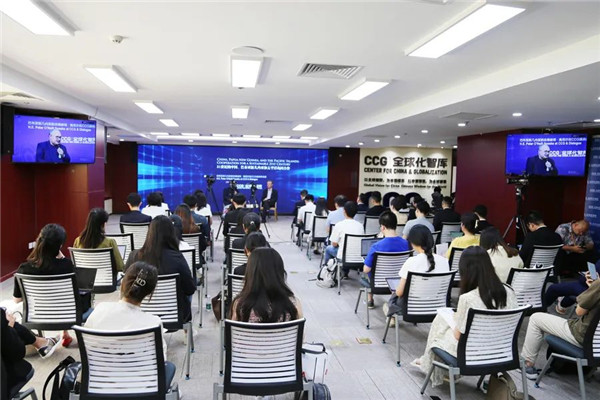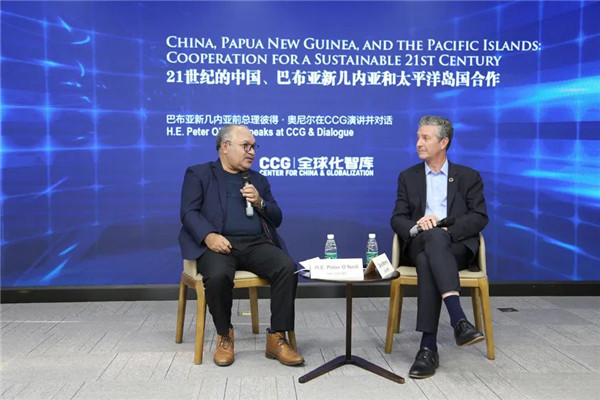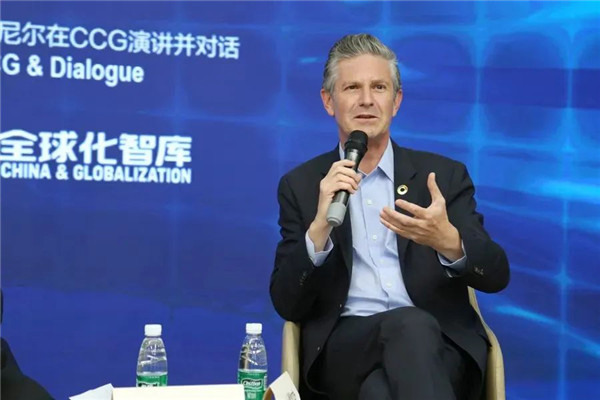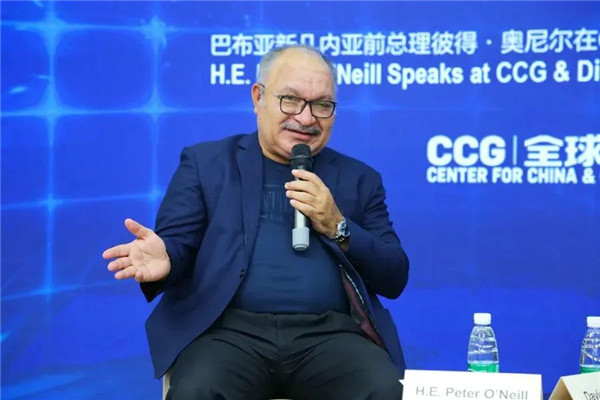TEXT | CCG in conversation with former Prime Minister of PNG
July 05 , 2023
On July 5th, 2023, Peter O’Neill, former Prime Minister of Papua New Guinea, gave a speech at the Center for China and Globalization (CCG) and engaged in dialogue with CCG Nonresident Senior Fellow, Vice Chair of UN ESCAP Sustainable Business David Morris. During the discussion, they shared insights on how China-PNG cooperation can reach a balance of development and equality facing the challenge of climate change and geopolitical tensions, as well as the future of regionalism for the Pacific Islands.

David Morris: Thank you very much. Thank you, Peter O’Neill, for such an interesting introduction. You’ve already addressed some of the issues I was going to ask you about, but we have a big theme. We have China, Papua New Guinea, and the Pacific Islands. These questions are about a sustainable future in the 21st century. So we’ll try in our limited time to touch upon all of those issues. And I’ll try and watch my clock as we do that.

And I will kick off with some questions, and then there will be an opportunity for everybody in the audience who’d like to ask a question. So please prepare your questions and be ready. We have a unique opportunity really in Beijing of having a former prime minister from Papua New Guinea here with us and an opportunity to ask questions. And I was going to ask you, Peter, about the challenges of development for a country like Papua New Guinea, and you’ve really addressed them very well in your opening comments.
And so I thought actually we have an opportunity today to introduce to the audience who haven’t had the opportunity as I have to visit Papua New Guinea – I’ve enjoyed visiting there about a dozen times I think – and one of the things I have to say to those who haven’t had that privilege, is that it’s such an interesting place, because it’s so culturally diverse. This is a country of 800 different language groups, incredible cultural traditions.
And so I thought we might take the opportunity to ask you just to introduce to us that the cultures of Papua New Guinea and in particular, why this is relevant to China? One element that I would think is very relevant if you’re a Chinese investor would be to understand customary land ownership and some of those traditional cultural questions.
So, you have it on culture first.
Peter O’Neill: Thank you, David. Papua New Guinea, as I was saying, is quite a large country in the Pacific. It’s in the half of the island of New Guinea which we call Papua, which on the other side is under the governance of Indonesia and on our side is Papua New Guinea, which is a country of its own.
But we have the same traditions and ethnic grouping, within that ethnic grouping, as on the other side, we’ve got about 13 million people; on our side, we got about 17 million people. So you’re talking about 30 million people on one island, 30 million people with some of the largest resources in the world. Both gold, copper, gas, and oil, both have been developed in stages at the moment. But culturally, we speak 800 completely different languages in Papua New Guinea, with over 1,000 different tribes.
On the other side, they were close to about 300 different languages from what I am told, so on one island of 30 million people, you got almost over 1,100 different languages spoken. It’s quite a diverse country and when you go and visit each of these villages, you’ll see that dances and cultural dressings are completely different from each other. It’s mostly because of the rugged mountains and rugged terrains and a huge forest. So the contacts were very isolated for many years. Only the coastal areas, because of some trading influence between Indonesia and Asian influence coming into the coastal areas, but within the mountains, very distinct and very isolated. Trying to build infrastructure through there with very limited resource and budget is quite challenging.

When we were in government, we’ve been trying our very best to access some of these communities. And some communities maybe 500 people, probably 1,000 people, but they still deserve our attention. They need their kids to go to school, they need the health services, they need infrastructure to save them as well. These are the sort of countries that David and I sort of have a first hand experience of being in the country, so we take it for granted. But it’s quite a delightful experience for any new visitor coming into PNG.
And in terms of environment, it’s very pristine. The ocean is completely blue and some islands have no people living on them and there are untouched beaches. So you can be the only person on the Island. So it’s a quite a beautiful country. And many Chinese will go to Papua New Guinea. Let me tell you this. We’ve got probably over, I would say 30,000 or 40,000 Chinese who live and work and do business there. As I said earlier, it is already the third or fourth generation for immigrants. Many Chinese who go there never come back to China; they’ll come and visit China only. When they come to China, they all want to go back to PNG, because the country has less population, more resources, better opportunities. So you can see a lot of Chinese who go there. They do very well, because they are hardworking people. Unfortunately, for my side of the population in PNG and the Pacific, we take life for granted. So we are a little bit slow in doing things. They’re relaxed in life. But hard working people do well in life in our country.
David Morris: There’s a reason why the national bird is called the bird of paradise, because we’ve just heard from Peter O’Neill about how really parts of Papua New Guinea are paradise, quite natural and pure wilderness.
But there are huge challenges for the people of Papua New Guinea and we heard about the rapidly growing population. I can remember it seems like yesterday that Papua New Guinea had 9 million people. That wasn’t that many years ago. And now to hear of 17 million, this is an opportunity and a challenge, right? Because it’s a huge challenge to have such a rapidly growing population and such a young population with the processes of development, with the wealthy energy and resources sector, and then the lack of wealth in other parts of the community. But equally, it’s a huge opportunity. If you have such a young population and a rapidly growing population, this is a real opportunity for economic growth. So, how to capture that opportunity? What are the industries where there’s real potential for Papua New Guinea in the decades ahead?
Peter O’Neill: Papua New Guinea ,as I said, the population is close to less than 60 %, probably 55 % of our population is under 25 years of age.
And because until about 2011-2012, when we took government, I introduced free education and free health care policy in the country, so we were able to migrate a few of them into better schools and giving them literacy opportunities and having them learn to read and write.
Unfortunately, the new government under the new prime minister has not been able to continue that program. He wanted to change the policy to better suit his own on the education system in the country. And unfortunately, that meant that it displaced many of the young people from the schools, because the parents were unable to pay for the school fees. The free education policy has been canceled.
Now, the biggest opportunity is equip these young people with more skills, so they can be able to either get a meaningful employment, get into business or give them the skills to look after themselves. That’s where the great opportunities, where the industries, resource development, mining and oil and gas, mining – all those require large numbers of skilled workers. In agriculture, we have one of the most fertile soils globally, I would say so is because it’s all volcanic soil and it’s very fertile. You don’t need fertilizers to really grow anything in the country. And the yields and some of the production is much higher. But it’s all in the very rugged mountains so getting access and infrastructure to that kind of land is also the challenge that we are facing.
So the opportunities for young people are in all these industries that can be set up. And to do that, you need foreign direct investment. And the Chinese are starting to lift their involvement in the country and more and larger mining and oil companies are coming to invest in PNG. In fact, most of our oil and gas are being exported to China. We know the resources that China needs. There is a good economic partnership that is going on. All we need to do is now work together to make sure that we leave the social standing of our communities and make sure that our people have got skills, educated, and healthy to be productive citizens of our country.
I think with that, you will have a smaller version of China in the Pacific quite easily, because it has got the resources to back it up, package opportunities and ambitions that it is for the people ahead of us.
So David, that’s where the opportunities are.
David Morris: And you mentioned the inspirational model of China and the development of China in the last 40 years or so, that demonstrates what can be done with strategy and with investment in education, as you say, in infrastructure and integration into global markets, all of those things that Papua New Guinea needs.
China obviously a very important economic partner for Papua New Guinea. How do you see the Belt and Road Initiative cooperation over the long term? What are the real opportunities there for both countries? From cooperating, from building that infrastructure, and from developing the new industries? What do you see as opportunities there?
Peter O’Neill: We Papua New Guinea were one of the first countries that signed up to the Belt and Road Initiative. And as part of that program, we have been able to access finance in China. We’ve been able to have access to very concessional finance from EXIM bank and of all the other commercial banks within China who have invested heavily into the infrastructure in our country. So it has enabled us to build universities and also hospitals in schools from high schools down to a primary level right across the country. We’ve been able to build ports and airports, roads right across the country. And it has certainly opened up the country in a very visible manner. And I think if someone who has visited our country, say 15 years ago would see the notice the changes that are taking place.
And you will see that that is also happening not only in Papua New Guinea, but right across the Pacific. You go to the small island countries, most of the infrastructure, including the main roads and stadiums and hospitals, are built by the Chinese initiative. And it is a great benefit and I think if those initiatives no longer available to these countries, the countries will fall back. Largely because the population is increasing. So we have to keep up the investment in these sectors as we go along. And there’s a great opportunity for both China and PNG, and the Pacific island nations.
David Morris: We talked about the diversity of Papua New Guinea. I want to ask you about the Pacific Islands region as a whole, because we have had this discussion in the Pacific for a long time, actually about how does our region develop? How do we work as brothers, if you like, as a family in the region, and in particular, the time that I worked for the Pacific Islands Forum here in Beijing a few years ago. Under the leadership in those days of Dame Meg Taylor, a very distinguished and famous Papua New Guinean, the Pacific Islands Forum leaders went through the process of developing this Blue Pacific Vision, identifying the Pacific as not small island states, but actually as large ocean states, because actually, the region of the pacific is a major region of the world. It’s a major region of the world for resources, for fisheries, and for energy.
How do you think that’s going? Peter? And as someone who’s led the largest Pacific Island country, what are your thoughts about the future of regionalism? And for the Pacific Islands region as a whole? What does it mean for development, for the economic development of the region?
Peter O’Neill: Our aim in the Pacific has always been to try and keep the Pacific pristine and accessible by everyone rather than trying to narrow it down to a few individuals or a few companies or a few countries. And by the agreements that we have signed along the 14 or 15 countries along the Pacific, has always been cooperative and consistent. As I said earlier, the geopolitics is now starting to put some some sort of cloud around some of the agreements that we have had. One of them is the recent defense cooperation agreement that Papua New Guinea has signed with the United States.
And I have been the biggest critic of that because I think it undermines Papua New Guinea’s constitution. No country in the world wants the constitution and the laws of their country to be undermined, no country in the world. And to do, if you want to change any laws or constitution, you have to go back to the people. Let the people make that decision through their elected representatives. And we have been assigned to the Nuclear-Free Pacific for many years. Now, given access to this kind of agreements, allows that to be breached. You can have nuclear ships and aircrafts also carry nuclear warheads to visit the Pacific quite freely now.
So some of the initiatives that we have taken is to try and keep the Pacific safe and the Pacific free of any of these confrontations. And we have had some very bad experience, I think, before the Second World War, where some smaller countries like the Marshall Islands where nuclear testing has taken place and destroyed the pristine environment. So we have got some experience around this. So we don’t want similar things happening in our countries. So that has been the main driving force behind the sort of general agreement that we all have taken. So there is a huge concern among communities with some of the recent developments taking place in the Pacific.
Second issue is, it’s a big ocean. And officially, this has been unregulated for a while. We’ve got some of the largest fishery stock in the world, particularly tuna. And this unregulated fishing has caused us a lot of problems. And that’s coming from some of our friends in Taiwan and Japan and few other places, who are just going in and fishing in some of the economic zones is that of east of our countries, and that is a caution concern.
I think the greater role that some of our bigger economic based countries in the region who can regulate this better come and help us sort of manage it, so we can sustain this is the fisheries for the future generation. We need to make it available for the future. We shouldn’t be depleting it such that they become extinct and nobody else can have tuna in the future. So I think the Pacific is now under a situation where there’s a lot of uncertainties. When you go to some of the countries that have now seen changes of government – you will see many of the countries have changed the government over. But this has raised concern among the population now, because there is now lack of consistency in the policies within the countries. Hopefully, our leaders can take stock of what’s the thinking of their people and the expectations of their people before they make policy changes that are detrimental to our countries and our people.
David Morris: You’ve talked about the very practical question of fisheries, management and how sustainability of fisheries is absolutely essential to economies such as Papua New Guinea.
I want to ask you about sustainability in general, because the climate crisis that we are now facing, that is getting worse every year. We seem to be on track not to meet the United Nations goals for 2030. We seem to be heading towards 3 % rise in the global temperature by the end of the century, which could be catastrophic for the Pacific. What has been the position of Papua New Guinea? And is it a consensus position in the Pacific around what we need to do as a global community in relation to climate change? And what’s your personal view on? How do we grapple with this challenge to all of us?
Peter O’Neill: Climate Change is a very big issue for the Pacific Island countries, as rising sea levels can continue to displace communities. Many of the islands are not, I think, higher than 1 meter, so in some places, the rising sea levels are now going into their houses and displacing the communities at very low level lying islands.
Firstly, the migration of those people is to higher safety and safer grounds is a big issue because some of the larger countries are not willing to take those migrants into their countries. And secondly, I’ve attended a few of those COP meetings during my time, and quite frankly, I think everybody’s talking and making big announcements, but there is no real effort in addressing the climate challenges that we have in the world today.
And at the most, at risk are the poorest countries and the smallest countries with a especially at the low lying sea levels. We are encouraged by China’s stance in this issue and the commitments that China has made. And in fact, over the last few years I’ve been coming back to China, visiting China and I see more electric cars on the road, which is a big effort in itself and trying to address these issues for us.
And the real meaningful efforts that China has put in is commendable. And we hope that we can do more partnerships in the region, especially in protection of some of the low lying. Papua New Guinea is OK – we’ve got many mountains, so we can all migrate on the mountains. It’s not of our concern. We are worried about many of our brothers in the Pacific.
Note: The above text is the output of transcribing from an audio recording. It is posted as a reference for the discussion.
TEXT | CCG in conversation with former Prime Minister of PNG
TEXT | Peter O’Neill: Cooperation for a Sustainable 21st Century






